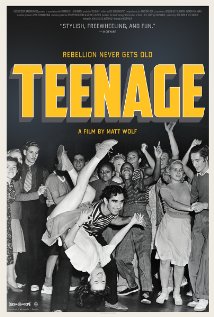
Triumph of the Will is a 1935 German Nazi propaganda film directed, produced, edited and co-written by Leni Riefenstahl. Adolf Hitler commissioned the film and served as an unofficial executive producer; his name appears in the opening titles. It chronicles the 1934 Nazi Party Congress in Nuremberg, which was attended by more than 700,000 Nazi supporters. The film contains excerpts of speeches given by Nazi leaders at the Congress, including Hitler, Rudolf Hess and Julius Streicher, interspersed with footage of massed Sturmabteilung (SA) and Schutzstaffel (SS) troops and public reaction. Its overriding theme is the return of Germany as a great power with Hitler as its leader. The film was produced after the Night of the Long Knives, and many formerly prominent SA members are absent.

Wandervogel is the name adopted by a popular movement of German youth groups from 1896 to 1933, who protested against industrialization by going to hike in the country and commune with nature in the woods. Drawing influence from medieval wandering scholars, their ethos was to revive old Teutonic values, with a strong emphasis on German nationalism. According to historians, a major contribution of the Wandervögel was the revival of folk songs in wider German society.
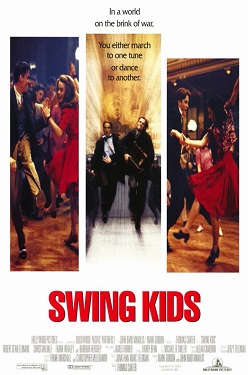
Swing Kids is a 1993 American historical drama film directed by Thomas Carter in his feature film debut, and starring Robert Sean Leonard, Christian Bale, Frank Whaley, Barbara Hershey and Kenneth Branagh. The title refers to a youth subculture in Nazi Germany, in which teenagers embraced American and British swing music in defiance of the Nazi regime. The film follows two high school students in their attempt to be swing kids by night and Hitler Youth by day, a decision that acutely impacts their friends and families.

The Swing Youth were a youth counterculture of jazz and swing lovers in Germany formed in Hamburg in 1939. Primarily active in Hamburg and Berlin, they were composed of 14- to 21-year-old Germans, mostly middle or upper-class students, but also including some in the working class. They admired the "American way of life", defining themselves in swing music and opposing Nazism, especially the Hitler Youth. They loosely structured themselves into “clubs” with names such as the Harlem Club, the OK Gang, and the Hot Club. This underground subculture, distinctly nonconformist with a focus on African-American music, was active in the German youth scene. Despite being largely apolitical and unstructured, the Swing Youth were targeted and, in some cases, repressed by the Nazi government.
The German Youth Movement is a collective term for a cultural and educational movement that started in 1896. It consists of numerous associations of young people that focus on outdoor activities. The movement included German Scouting and the Wandervogel. By 1938, 8 million children had joined associations that identified with the movement.
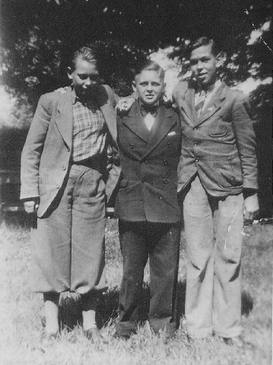
Helmuth Günther Guddat Hübener was a German youth who was executed at age 17 by beheading for his opposition to the Nazi regime. He was the youngest person of the German resistance to Nazism to be sentenced to death by the Sondergericht People's Court (Volksgerichtshof) and executed.
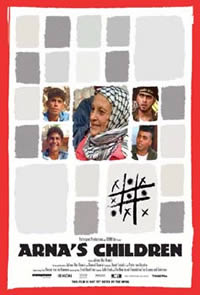
Arna's Children is a 2004 Dutch-Israeli documentary film directed by Juliano Mer Khamis and Danniel Danniel. The film's story revolves around a children's theater group in Jenin in the Palestinian territories established by Arna Mer-Khamis, the director's mother, an Israeli Jewish political and human rights activist.

Scott Crary is an American film director, producer and writer, best known for having directed, produced, filmed and edited the film Kill Your Idols, a documentary examining three decades of New York art punk bands.

Eberhard Koebel also Eberhard Köbel, called tusk, i.e., "the German" in the language of the Sámi people he traveled among, was a German youth leader, writer, and publisher.

The Architecture of Doom is a 1989 documentary by Swedish director Peter Cohen and narrated by Rolf Arsenius. German- and English-language versions have also been released.

Karl-Heinz Schnibbe was a German Resistance to Nazism member during World War II who, as a 17-year-old growing up in Nazi Germany in 1941, was an accomplice in a plan by three German teenagers, members of the Church of Jesus Christ of Latter-day Saints (LDS), to distribute information to the citizens of Germany on the evils of the Nazi regime during World War II. Led by 16-year-old Helmuth Hübener, the three boys created, posted and distributed cards and pamphlets denouncing Hitler and the Nazi Party. They were eventually caught by the Gestapo and, after repeated beatings, were convicted and sentenced. Hübener was executed, the youngest person to be sentenced to death for opposing the Third Reich, and Schnibbe was sentenced to five years in a labor camp. After the war and his release from a Soviet POW camp, Schnibbe emigrated to the United States in 1952, living in the Salt Lake City, Utah area until his death on May 9, 2010.

Planet B-Boy is a 2007 documentary film that focuses on the 2005 Battle of the Year while also describing B-boy culture and history as a global phenomenon. This documentary was directed by Canadian-American Korean filmmaker Benson Lee, shot by Portuguese-American filmmaker Vasco Nunes, and released in theaters in the United States on March 21, 2008. It was released on DVD on November 11, 2008.

The Boys from Baghdad High, also known as Baghdad High, is a British-American-French television documentary film. It was first shown in the United Kingdom at the 2007 Sheffield Doc/Fest, before airing on BBC Two on 8 January 2008. It also aired in many other countries including France, Australia, the United States, Canada, Germany and the Netherlands. It documents the lives of four Iraqi schoolboys of different religious or ethnic backgrounds over the course of one year in the form of a video diary. The documentary was filmed by the boys themselves, who were given video cameras for the project.

Wild Combination: A Portrait of Arthur Russell is a documentary film about musician Arthur Russell, directed by Matt Wolf. Released theatrically in 2008, the film was generally well received by critics, winning various awards at international film festivals. Its world premiere was at the Berlin International Film Festival (Panorama), and its theatrical premieres were at the IFC Center in New York and the ICA in London.
Ladies and Gentlemen... Mr. Leonard Cohen is a 1965 National Film Board of Canada documentary about Leonard Cohen, co-directed by Don Owen and Donald Brittain, written by Brittain and produced by John Kemeny.
Todd Berger is an American film director, screenwriter, actor, and novelist most prominently known for writing and directing the feature films It's a Disaster, Cover Versions, The Scenesters, and the documentary Don't Eat The Baby: Adventures at post-Katrina Mardi Gras.

A Brony Tale is a 2014 Canadian-American documentary film directed by Brent Hodge. The film explores the brony phenomenon, the adult fan base of the children's animated show My Little Pony: Friendship Is Magic that arose shortly after its premiere in 2010. The film is structured around the journey of Ashleigh Ball, one of the principal voice actresses for the show, including her initial reactions to learning of this older fanbase, and her travel as a Guest of Honor to one of the first fan conventions BronyCon held in New York City in 2012. Hodge, a close friend of and previous collaborator with Ball, was curious as she was as to this phenomenon and opted to film her travel and appearance at the convention for the documentary.
Melita Maschmann was a German memoirist. She achieved renown with her 1963 book Fazit: Kein Rechtfertigungsversuch which recounted her years as a member of the Hitler Youth and a propagandist for the Nazi machine.

Matt Wolf is an American filmmaker, documentarian, and producer. His notable films include Wild Combination: A Portrait of Arthur Russell, Teenage, Bayard & Me,Recorder: The Marion Stokes Project, and Spaceship Earth. In 2010, he was awarded a Guggenheim fellowship. His subjects include youth culture, artists, archives, music, and queer history.
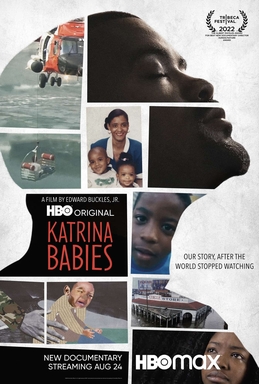
Katrina Babies is a 2022 documentary film, directed by Edward Buckles Jr. It explores the narratives of kids who experienced Hurricane Katrina and the impact of the storm’s aftermath on New Orleans youth. It premiered at the Tribeca Festival on June 14, 2022 and was released on HBO Max on August 24, 2022.
